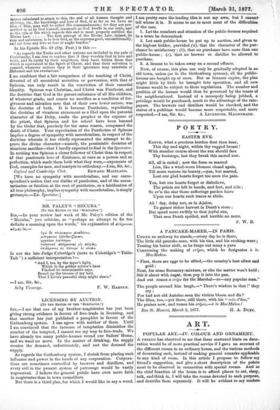LICENSING BY AUCTION.
Exo THE EDITOR OF THE " SPECTATOR.") SIR,—I see that one of my brother-magistrates has just been giving strong evidence in favour of free-trade in licensing, and that another has just published a pamphlet in favour of the Gothenburg system. I can agree with neither of them. Until
I am convinced that the increase of temptation diminishes the number of the tempted, I cannot see my way to free-trade. We have already too many public-houses round our Sailors' Home, and we want no more. In the matter of drinking, the supply creates the demand, unfortunately, and not the demand the supply.
As regards the Gothenburg system, I shrink from placing such influence and power in the hands of any corporation. Corpora- tions are sometimes controlled by brewers and distillers, and every evil in the present system of patronage would be vastly augmented. I believe the general public have even more faith in magistrates than in town councillors.
But there is a third plan, for which I would like to say a word. I am pretty sure the leading idea is not my own, but I cannot tell whose it is. It seems to me to meet most of the difficulties of the case.
1. Let the numbers and situation of the public-houses required in a town be determined.
2. Let each public-house be put up to auction, and given to the highest bidder, provided (a), that the character of the pur- chaser be satisfactory ; (b), that no purchaser have more than one public-house ; (c), that no brewer or distiller be allowed to purchase.
3. A license to be taken away on a second offence.
Now, of course, this plan can only be gradually adopted in an old town, unless (as in the Gothenburg system), all the public- houses are bought up at once. But as licenses expire, the plan might little by little be brought into operation, and all new licenses would be subject to these regulations. The number and position of the houses would thus be governed by the wants of the neighbourhood. Instead of a monopoly being jobbed, a privilege would be purchased, much to the advantage of the rate- payers. The brewers and distillers would be checked, and the status of a publican would become more respectable, and more


































 Previous page
Previous page